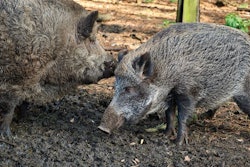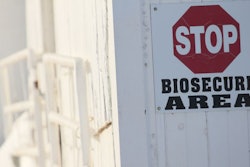
Some countries that are ASF-free are 66-100% likely to be infected in the next year.
An expert panel has assessed the risk of African swine fever (ASF) spreading to eastern European states that are currently free of the disease to be between 66 and 100% in the next year.
“Very high” was the way an expert panel at the European Food Safety Authority (EFSA) described the risk of (ASF) spreading to eastern and southeastern European states that are free of the disease.
According to their study, published in the EFSA Journal, the risk is estimated at 66-100% that ASF will occur in the following states in the next 12 months: Albania, Bosnia and Herzegovina, Croatia, Greece, Kosovo, Montenegro, North Macedonia, Serbia and Slovenia.
In contrast, the probability that ASF will spread from currently infected countries to western member states of the European Union is less than 15%, according to the report’s authors.
In assessing the risk of the entry of the disease, the multinational group from the EFSA Animal Health and Welfare Panel considered the indicators present in each country. They then combined each of these with the known effects on the spread of ASF. For example, the presence of wild boar is widely accepted to increase the likelihood of ASF. This may be exacerbated by societal factors, and the structure of the domestic pig sector.
Controlling ASF spread
At all levels, improved surveillance, communication and collaboration are key to controlling the spread of ASF, the report concluded. These were incorporated in control plans that have been in place in the EU since 2014.
The authors recommended focusing on early detection and preparedness. Surveillance of both wild boar and domestic pigs is vital for early detection of the infection, and boar numbers must be reduced, they said.
Awareness campaigns should aim to reduce the risks of disease transmission by people, and these campaigns need to be supported by national authorities and stakeholders. In order to improve detection and disease control, EFSA also identified specialist training of veterinarians, hunters and other parties.
New outbreaks in domestic pigs in Romania, Russia
Based on official reports to the World Organisation for Animal Health (OIE) over the past week, the only European countries to have detected new ASF outbreaks in domestic pigs were Romania and Russia.
In various regions of Romania, a total of 25 outbreaks of the disease were confirmed over the period of October 6-28, affecting almost 4,200 pigs. ASF was confirmed at one farm in the southwestern county of Olt, where 19 of the 3,774 animals died. All other outbreaks were in herds described as “backyard” in counties in the south, southeast, southwest, central and northwest of the country.
Over the past week, Russia’s agriculture ministry has reported one new ASF outbreak to the OIE. This affected a farm with about 1,400 pigs, three of which showed clinical symptoms. The premises was in Stavropol oblast, making this the first outbreak in the North Caucasian federal district. Source of the infection is unknown.
ASF confirmed in wild boar in 7 European states
Worst affected in terms of numbers of wild boar found to be infected with ASF and reported to the OIE is once again Poland. There, a further 137 wild boar have tested positive for the disease, in cases dating back to July and August.
Other states reporting ASF in wild boar to the OIE over the past week were Latvia (34 animals), Romania (25), Bulgaria (12), Ukraine (2), and Slovakia and Belgium with one wild boar each.
The Ukrainian animals were both found in Kirovohrad oblast, where the last reported case of ASF was in early September.
The one case reported to the OIE by the animal health agency in Belgium was found — like all previous cases over the past year — in the province of Luxembourg. The virus was detected in the bones of an animal that had been dead for at least six months. The last case of ASF in a live or recently shot wild boar in the country was during the second week of August.
For the past month, cyclists and walkers have been unable to access the forest areas where ASF has been detected in wild boar. This has been to facilitate the safe elimination of any remaining sero-positive animals.
Africa: South Africa, Zimbabwe report new ASF outbreaks
The number of ASF confirmed by South Africa’s agriculture department to the OIE has risen to 17. The disease was detected in a fifth village herd in the state of Mpumalanga at the end of October after 30 pigs died.
As with the previous outbreaks, the village lies outside the country’s ASF Control Zone. It brought total direct losses of pigs from the disease since August to almost 3,300.
After a single outbreak of ASF in January 2019 in Manicaland, Zimbabwe’s veterinary authority reported the disease at a village in the Mount Darwin region of Mashonaland Central in late August. The agency has now confirmed to the OIE a further six outbreaks among free-ranging herds of mixed ages at other villages in the same region.
According to the official report, the district is in quarantine, and the authorities are investigating the source and extent of spread of the infection. Manicaland and Mashonaland Central border Mozambique, and the outbreaks have occurred close to the frontier.
Other African states that have confirmed ASF cases during 2019 are Ghana, Ivory Coast (Côte d’Ivoire) and Kenya.
View our continuing coverage of the African swine fever outbreak.

















